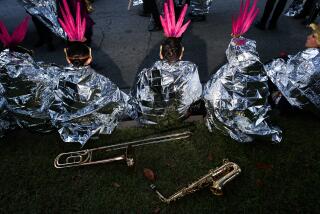Tournament Cost Estimate Off by $388,298 : Finances: An independent study of Tournament of Roses costs overstated the loss. Consultant says conclusions were based on data and feedback supplied by the city.
PASADENA — Call it a $388,298 misunderstanding.
Embarrassed city officials are still trying to explain how an independent study of city costs showed the city losing almost $500,000 a year on Tournament of Roses activities, when the real figure should have been $79,070.
“It was an error in communication,” said Robert Person, assistant to City Manager Philip Hawkey.
“It wasn’t bad information,” Hawkey added. “It was how it was categorized.”
The problem was that the error, in a report prepared by Anaheim-based Management Services Institute, has become part of the racial exclusion controversy that has swirling around the tournament for the past six months.
A group of black civic leaders has charged that the tournament, while drawing ample subsidies from the city, has practiced discrimination against Pasadena’s minority community--excluding blacks and Latinos from positions of influence in the organization, and depriving minority businessmen of contracts.
Actually, the tournament contends, the city profits by better than $1 million a year from the Rose Parade and the Rose Bowl college football game.
The misunderstanding appeared in April in a $295,000 study by MSI which, for 18 months, studied costs of services delivered by the city.
The costs to the city for putting on the Rose Parade and the Rose Bowl game have been “massively underreported” by city staff, the report said.
Taking 1992 as its model, MSI reported that the New Year’s Day events actually cost the city $468,368 in staff time and wear and tear on city facilities.
The Ad Hoc Committee to End Discrimination, armed with alleged evidence that Pasadena “continues to suffer substantial economic loss” because of tournament activities, charged in a report this spring that the tournament has long practiced racial exclusion.
The committee, led by black businessmen and civic leaders, has demanded that the tournament add enough minority group members to its executive committee by Aug. 1 to make it 40% minority-led.
Now, the tournament has counterattacked with a report of its own, showing that, when “indirect revenues” and tournament outlays for Rose Bowl improvements are included in the balance sheet, the city comes away with a profit of $1,065,235.
Jack French, executive director of the tournament, said he spotted the error in the MSI report almost immediately.
“It took me about 10 seconds,” he said.
The consultants, in laying out the balance sheet, had mistakenly allotted a sum of city revenues to the tournament, French said.
MSI Chairman Douglas W. Ayres admitted the error in a letter to city officials, saying the firm’s conclusions were “based on data and feedback supplied by city staff.” Ayres could not be reached for comment.
Person, who coordinated the MSI report for the city, said that information had either been misinterpreted by MSI staff or miscommunicated by city staff.
But the information did not mollify Jim Morris, a developer who is a leader of the Ad Hoc Committee. “All of a sudden, guess what? There’s a $390,000 mistake.”
He said the timing of the revelation--a month before the Ad Hoc Committee’s deadline for including more minorities in tournament leadership--made him suspicious.
Committee members add that the sharing of profits and costs for the New Year’s Day events is just one aspect of the city’s complicated relationship with the tournament.
More to Read
Sign up for Essential California
The most important California stories and recommendations in your inbox every morning.
You may occasionally receive promotional content from the Los Angeles Times.










